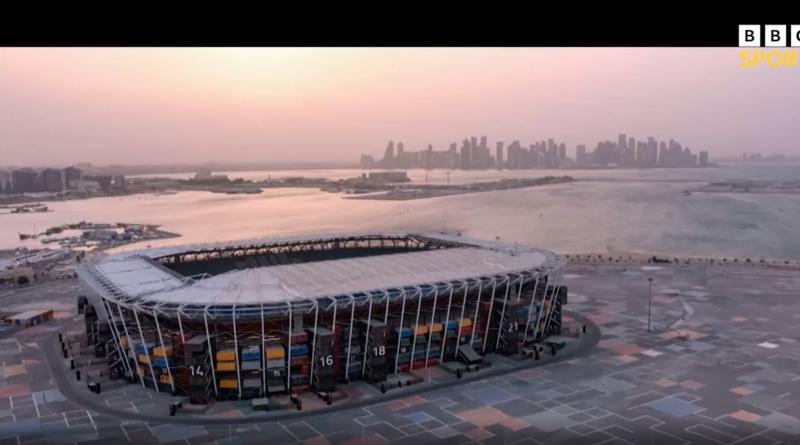Is Fifa's football expansion putting money before planet?

Last week Fifa president Gianni Infantino announced record revenues in excess of $7.6bn (£6.3bn) - with football's governing body also confirming plans for further expansion and growth.
But does big money for the global game come at a big cost to the planet? And does that fit with Fifa's statements on sustainability and emissions reductions?
Fifa's expansion plans include:
- Confirmed expansion of the men's Club World Cup from seven teams to 32
- Growing the men's World Cup from 32 teams to 48 and staging it across a continent in 2026
- Increasing the number of teams at the Women's World Cup from 24 to 32
- Hosting an entirely new Women's World Cup qualifying tournament for 10 teams in New Zealand
- Plans to introduce a new women's Club World Cup
Fifa's claim that the Qatar World Cup was carbon neutral was considered by experts to be "misleading and dangerous", and its plans for further expansion come in spite of the fact Fifa's environmental strategy includes having signed up to the UN Sport for Climate Action Framework - with a target of net zero by 2040 and halving of emissions by 2030.
The majority of sport's carbon footprint comes from fan travel. Last year Fifa estimated about one million supporters would travel to Qatar for the men's World Cup - and more teams in 2026 will mean more fans, with the same applying to the expanded Club World Cup.
Wycombe Wanderers player David Wheeler, the Professional Footballer's Association sustainability champion, described the 2026 World Cup logistics as a "nonsense" and a "money-making exercise".
He also questioned the quality of the football in expanded tournaments such as the Club World Cup, comparing it to "junk food".
"We're damaging the climate - the climate is sick and potentially terminally ill," said Wheeler.
"We know how to reverse course, but instead we're doing the very thing that's making it sick and that's what I think Fifa is suggesting to do".
In the women's game there are fewer travelling fans compared with the men's, but the number is growing and Fifa has announced more than half a million ticket sales for this summer's Women's World Cup in Australia and New Zealand.
However, a newly created qualifying tournament - with 10 teams flying to New Zealand for 13 new games in the calendar to decide the final three places - has been called "unnecessary".
Ireland and Reading defender Diane Caldwell, who will be at her country's first Women's World Cup, said: "I'm sure Fifa will say they've done it to help the women's game grow. Of course we all want the game to grow, but it can be done in a sustainable way and not by flying 10 teams from different continents to New Zealand to compete. I think definitely it could have been avoided."
Caldwell, who is part of We Play Green, a group of Football players speaking up on environmental issues, added: "They need to really re-evaluate what's going to be their long-term ethos - is it going to be profit over planet? You can't forget the power that football has - it's the most followed sport in the world. If football cares about the climate crisis and actually demonstrates cutting emissions, can you imagine the impact that could have on billions of fans across the world?"
New Zealand and Hearts forward Katie Rood added: "The sooner we adapt and change the longer we can play and keep enjoying these tournaments. If we truly have our future at the heart of our decisions then we can't keep talking about expansion and growth of these major tournaments.
"These are the pinnacle events - you want the best of the best. If you are continuously expanding you kind of lose the heart of what that was all about in the first place.
"What does the World Cup mean? Is it for them, for the athletes, for the fans or is it for the advertisers and for the profits?"
Dr Madeleine Orr, a sport ecologist based at Loughborough University, said she was "sceptical" of Fifa and said its growth plans were "completely contradictory to sustainability goals". She added that football should start to consider "smaller venues, smaller scope and scale of tournaments", meaning "fewer fans" to prioritise local supporters.
"We have this influential power that is not being tapped," she added. "We have more air time, more media coverage because of sport, and to not use that platform to send a bigger message about sustainability is a missed goal."
In a response to BBC Sport, Fifa said the new Women's World Cup play-off tournament was a collective decision, and that it is "fully aware that climate change is one of the most pressing challenges of our time", and that as an organisation it has "been making substantial efforts to tackle those impacts and, at the same time, to use opportunities to maximise the positive effects of its most iconic tournaments".
"We remain committed to continuously improving our approaches," it added.





